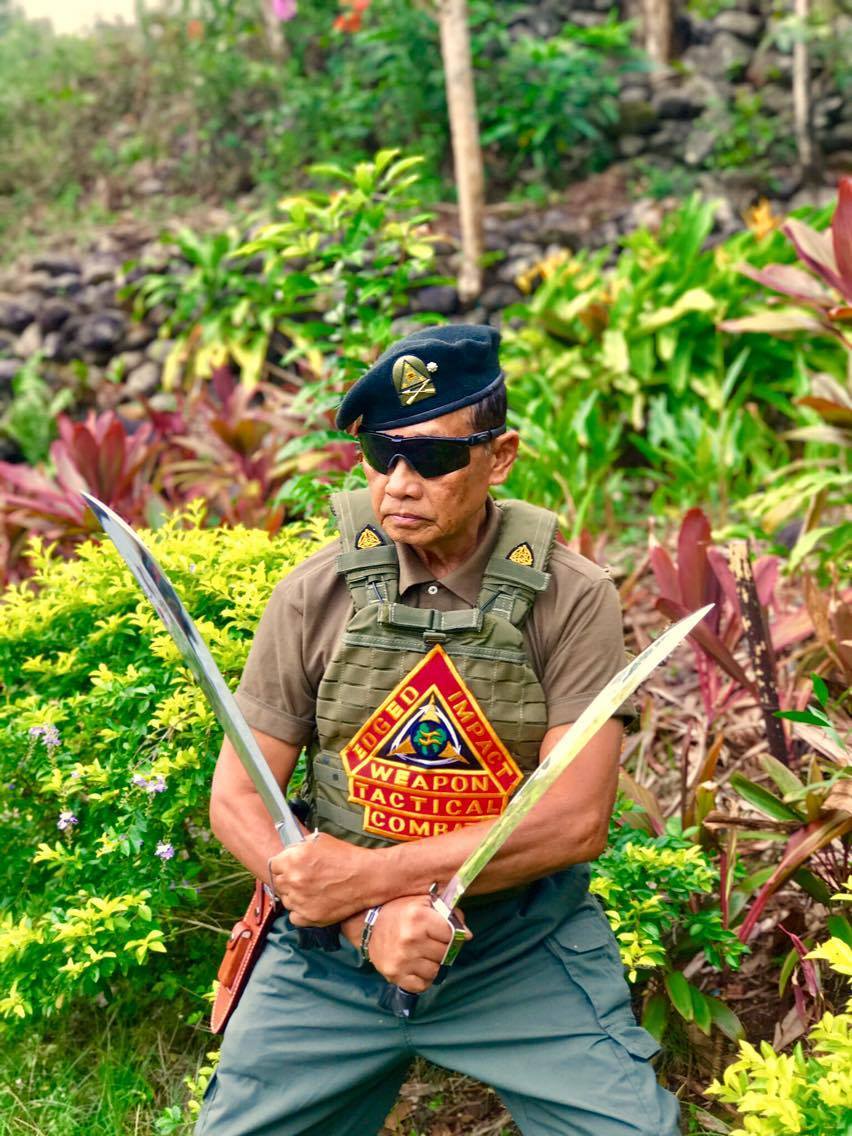What is Kali?
Kali is the indigenous fighting arts of the Philippines. While Filipino Martial Arts (FMA) is an umbrella term for the various forms and systems of the Philippines that include Arnis, Eskrima, and Kali, the term Kali is rooted in the indigenous languages of the Philippines and can be expressed as ᜃᜎᜒ whereas the words Arnis and Eskrima are rooted in the Spanish colonial language.
Etymology:
Arnis comes from arnes de mano, Spanish for “harness of the hand,” or “armor of the hand,” used to describe the way colonizers observed Filipinos resist and fight back with empty-handed combat. Eskrima comes from esgrima, the Spanish term for “sword fighting,” used to describe the movements Filipinos displayed with the use of the long blade as a weapon.
Kali is the term used by our ancestors to describe the ancient Filipino fighting method, referring to the hand and body motion with the blade, and the characteristic of it being secret knowledge, only taught within the family to protect against oppressors. KA and LI are sounds rooted in the indigenous Filipino languages and writing systems, and can be expressed in Baybayin as: ᜃᜎᜒ
According to Grand Tuhon Leo T. Gaje Jr., “Kali has a long history as a successful fighting method and lifestyle in the Philippines. It was the Kali warriors that killed Ferdinand Magellan. As a matter of fact, the research done by the oldest University in the Philippines, University of Santo Thomas, recently found that the name of the Datu that killed Ferdinand Magellan is Kalikulapu.”
The term, “KA” is an important term in Filipino revolutionary history, symbolically with the Katipunan, and linguistically as a prefix for many words and terms. Kali- is also a common prefix used in various terminology and vocabulary throughout the archipelago.
Survival Arts encourage the use of the term Kali because of its roots within the indigenous language and writing systems. Kali is a close-quarters combat system based on the use of the blade, the science of tactical strategy, and the concept of survival through a long history of resistance and resilience.
Grand Tuhon Leo T. Gaje Jr. with Suryadi “Eddie” Jafri (RIP), and Guro Dan Inosanto
Pekiti Tirsia Kali
Pekiti Tirsia Kali (PTK) is a sacred family system of Filipino fighting arts, originating from Negros Occidental in the Western Visayas region of the Philippines. This blade culture has protected the family since 1897, tracing its roots back to more than 2,000 years ago.
Pekiti Tirsia Kali is a complete Close Quarters Combat system that specializes in Edged & Impact Weapon Control Dynamics, from Ancient Warfare to Modern Weaponry.
As tradition, Pekiti Tirsia Kali was passed down through the family bloodline, from Conrado Tortal to his only grandson, Leo T. Gaje Jr. Now known as the Grand Tuhon, or “Grand Master” of the system, Grand Tuhon Leo T. Gaje Jr. is the Guardian and Source of the family system of Pekiti Tirsia Kali.
Grand Tuhon brought the Pekiti Tirsia Kali system from the Philippines to the Unites States in the 1970s, becoming a a 3-time Hall of Fame awardee and Weapons Master Instructor recognized around the world. Through his teachings, the system now spans over 25 countries, commanding military and law enforcement groups throughout Asia Pacific, India, and Europe. Grand Tuhon’s contribution to the Filipino fighting arts and Filipino Martial Arts (FMA) community is unsurpassable, making him one of the greatest living legends of our time, and making Pekiti Tirsia Kali internationally-renowned for survival strategy and tactics.
Pekiti Tirsia Kali is the only system that is recognized by the Philippines government, US military, and Special Forces Groups in India, Austria, and many other military and law enforcement units around the world. PTK is used to train the Marine Force-Recon Battalions of the Armed Forces of the Philippines, the Philippine Army Scout Rangers, the Special Action Force (SAF) contingent of the Philippine National Police (PNP), and the Presidential Security Group (PSG).
Pekiti Tirsia Kali training is an understanding of concepts rather than memorizing techniques, developing awareness, and building muscle memory. Students learn counter offense against multiple opponents, and offensive striking when unarmed against armed attackers. While PTK is an extremely effective and deadly combat art, it is most importantly, a sacred family system with the philosophy:
“We believe in Life, we don’t believe in Death.
We believe in Success, we don’t believe in Failure.
We believe in good Health, we don’t believe in Sickness.”

